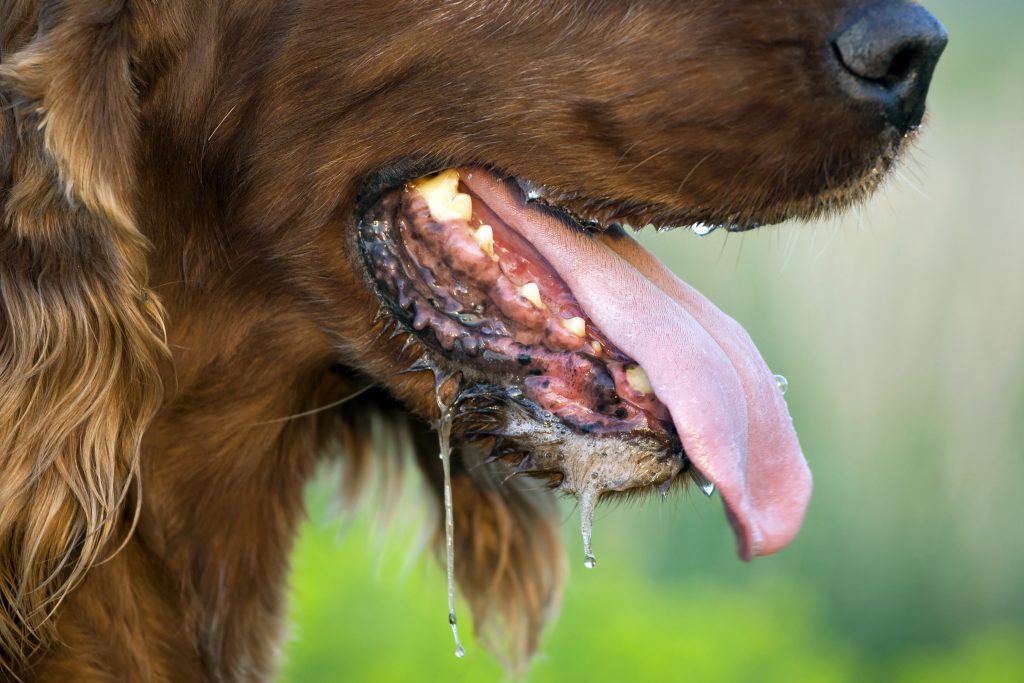A dog’s health and wellbeing can be quite like that of people. Some signs of an unhealthy dog can be obvious – like vomiting – but others can be more subtle and easy to overlook (think depression or lethargy).
And because dogs can’t tell us what’s bothering them in words we understand, it’s important for dog owners to keep an eye out for things that are not quite right. Being vigilant could even save their life!
If you’re concerned about your dog displaying any of the symptoms outlined below, contact your vet or nearest animal hospital as soon as possible.
1. Upset Stomach
An upset stomach can manifest itself by way of vomiting or diarrhoea – or both – and there are several possible causes.
Vomiting or diarrhoea in dogs are among the most common symptoms of poisoning – usually the result of them eating something that is toxic to pets.
There are many common garden plants that are poisonous to dogs, and also a number of foods that people readily eat but are also toxic to our canine friends.
Other toxic things that can eat and then suffer from vomiting and/or diarrhoea include snail pellets, rat/mice poison, household chemicals such as cleaners, or garden chemicals – even some natural/organic ones.
Then of course bites from poisonous animals, such as by a snake or a paralysis tick, can also cause vomiting.
The good news, however, is that vomiting and diarrhoea in dogs is not necessarily the result of poisoning. It can also be something less severe and more easily treatable, such as an infection, an allergy
Some dog owners have also seen their dogs temporarily get an upset stomach from eating various types of animal poo.

2. Excessive lethargy & paralysis
We all get sleepy, particularly after we’ve been exercising lots, and that can include dogs. But excessive or unusual lethargy can be a sign of an unhealthy dog. And paralysis can be a life-threatening emergency.
One of the biggest concerns in Australian dogs is paralysis ticks. But snake bites or ingesting certain toxic plants, foods or household poisons can also cause your dog to become limp or immobile.
Injuries are another thing to check for if your dog is reluctant to move or bear weight on one or more legs.
3. Trembling / lack of co-ordination
Trembling or a lack of co-ordination is another concern for dog parents. Again, it can be the early effects of poisoning from a snake or tick bite, or something they have eaten.
But injuries can also cause this problem, meaning it’s a good idea to check for any wounds or injuries.
Some may be obvious, such as an open wound that’s bleeding. Muscle and bone injuries can cause a dog to avoid putting weight on that leg.
Others, such as spinal injuries can be much less obvious, and will require a vet to diagnose the cause of the problem and then recommend a treatment plan.
4. Pale Gums
Just like humans, pale gums are one of the warning signs of an unhealthy dog. For most dogs, they should be a lovely shade of pink.
Quite often pale gums (gums which are very pale pink or even white) are a sign of dental problems, such as severe gum disease.
In extreme cases, Pale gums can also be a sign of anaemia (internal bleeding). A good test for this is “refill time”: gently press down on your dog’s gums for a couple of seconds. Then remove your finger and see how long it takes for the full colour to return.
5. Excessive drooling or panting

All dogs pant and some drool a lot more than others. But if you notice your pup is panting or drooling a lot more than usual, it can be a sign that something serious is wrong!
But finding out exactly what is wrong can be difficult, as many things can cause this.
The most obvious is something stuck in their mouth or throat. Bones can break apart and become lodged in the gums or stuck between teeth. As well as excess drool, your dog may be pawing at their mouth and/or twitching their lips in discomfort.
But if something is lodged further down their throat, you dog may need urgent veterinary treatment.
In fact, it’s a good idea to check with your vet whenever there is no obvious cause for excessive drooling or panting, as it can also be a sign of poisoning, obstruction, mouth tumours or other health concerns.
6. Sudden or unexplained weight loss / gain
Being overweight or obese is an increasingly common problem in Australian dogs. But – just like in people – this type of weight gain usually happens over longer periods. And it tends to be caused by poor diet and lack of exercise.
Sudden weight fluctuations, whether they be rapid weight loss or gain, can be much more serious in the short term.
There are a huge number of causes, such as dehydration, excessive vomiting or diarrhea, cancer, tumours, bloat, bowel obstruction or injury.
7. Skin Problems
Sometimes skin irritation in dogs can be obvious, such as a skin rash, fur loss or relentless scratching. Like most dog health concerns, there can be a range of causes.
Be sure to check for fleas and mites. Some dogs are allergic to flea bites, making them even more itchy and painful, and prone to excessive scratching.
Also check your yard for possible irritants – grass seeds, wandering dew and other irritating plants.
Washing your dog too often can also cause skin irritation, as can the type of shampoo you use. Never use human shampoo on your dog: their skin is different to ours, which is why specialist pet shampoos exist.
Rashes can also be a sign of allergies to food or medications, so again, it may be wise to have consult with your vet.
Other signs of an unhealthy dog
Of course, there are many problems and behaviours that can be signs of an unhealthy dog. And they can be caused by a range of things, from illness, injury or being bitten by something, through to swallowing something dangerous or poisonous, extreme anxiety or even something as simple as boredom!
So be sure to also keep on eye on your dog for any of the following:
- anxiety (often the root cause of excessive barking, pacing, digging or destructive chewing)
- being overweight or obese for their breed and size
- excessive drinking and/or urinating
- coughing
- bloating
- pain or sensitivity to touch
- breathlessness or excessive panting
- dragging their bottom along the ground (commonly a sign of intestinal worms)
Related articles:
Sources:
Animal Emergency Centre
https://www.aecvets.com.au/wp-content/uploads/2019/09/Common-Pet-Toxins-2016.pdf
Burke’s Backyard
Food Standards Australia New Zealand
https://www.foodstandards.gov.au/consumer/safety/Pages/Apricot-kernels-raw.aspx
Greencross Vets
Vet Voice (Australian Veterinary Association)
https://www.vetvoice.com.au/media-releases/avoid-an-unplanned-visit-to-the-vet-this-christmas/










